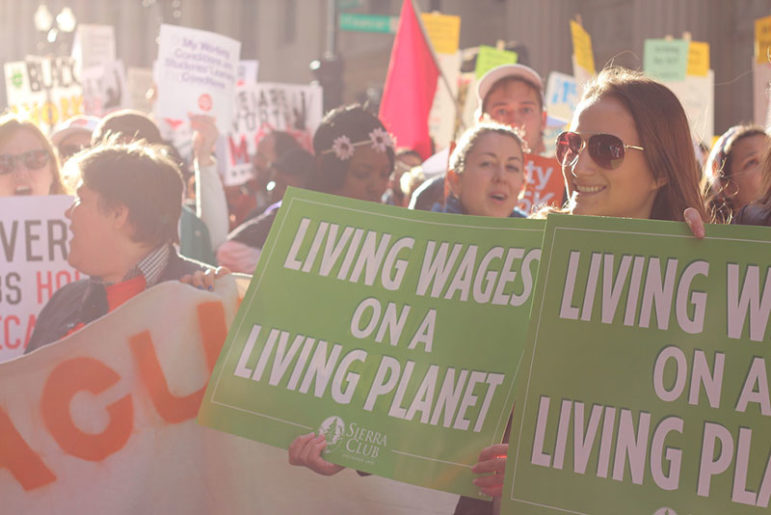
October 26, 2016; Chicago Tribune
In 2014, President Obama stated a simple truth: “Americans overwhelmingly agree that no one who works full time should ever have to raise a family in poverty.” On Wednesday, the Cook County Board in Illinois set a path for its minimum wage to reach $13 by 2020. Local actions like these are taking place all over the country, but they do leave nonprofits in an odd position. If the state does not make the same change, can it be pushed to match its rate to wage requirements?
The hike, of course, is welcome news for minimum wage workers in the suburbs surrounding Chicago, who will see the first impact of the new law when their hourly wages grow from the current state minimum of $8.75 to $10 after January 1, 2017. For a single person, this increase will fulfill the president’s vision and place them well above the federal poverty guideline of $11,880. (A family of four will still need to wait two more years, or for one wage earner to get them above the $24,300 poverty line.)
Hearing the voices of those who struggle to afford basic life needs, a growing number of local governments, tired of waiting for higher bodies to act, have chosen to raise wages within their borders. Cook County Commissioner Larry Suffredin, who sponsored the proposal, said he’d hoped “for the state to pass a minimum wage law, but a proposal…has languished since 2009.” Cook County had more patience than the city of Chicago, which began raising its minimum wage toward a $13/hour goal a year earlier.
Acting locally is not without problems. With three different minimum wages now in effect in the metropolitan Chicago area, some fear the loss of jobs. According to the Chicago Tribune…
Sign up for our free newsletters
Subscribe to NPQ's newsletters to have our top stories delivered directly to your inbox.
By signing up, you agree to our privacy policy and terms of use, and to receive messages from NPQ and our partners.
Several trade groups representing the retail and restaurant industries opposed the measure, saying businesses operating on three to five percent profit margins already are squeezed by a battery of cost increases. Among them are a federal rule extending overtime pay to millions more Americans that takes effect December 1st, and new city and county laws requiring all employers offer paid sick leave, beginning July 1st. Sam Toia, president and CEO of the Illinois Restaurant Association, said he supports a statewide minimum wage increase to $11 an hour, but worries a county-specific law puts businesses at a disadvantage against their competitors across the county line.
“Our businesses don’t operate on an island,” Toia said.
As with the federal government’s recent action on overtime for salaried employees, increasing the minimum wage is a special challenge for nonprofit organizations. Rick Cohen, writing for NPQ, observed that nonprofits face a unique dilemma in balancing mission and survival.
The nonprofit sector…has the dual responsibility of crafting and advocating policies for the advancement of the constituencies they serve and simultaneously figuring out how they as nonprofits can financially and administratively survive to deliver on their missions.
This challenge grows more difficult when minimum wage policy is established in a piecemeal manner. The funding mechanisms are not connected to the wage standard setting mechanism and so it becomes more difficult to insist that mandated increases are met with rate hikes. This may require a more cohesive and assertive approach to wages by state associations of nonprofits across the Country. Commissioner Suffredin continues to hope “the General Assembly will pass something” to set all this aright.—Martin Levine












